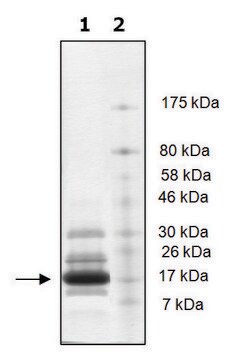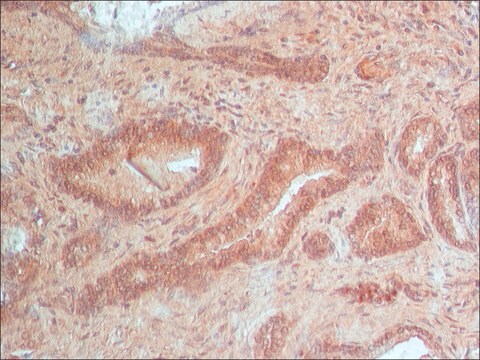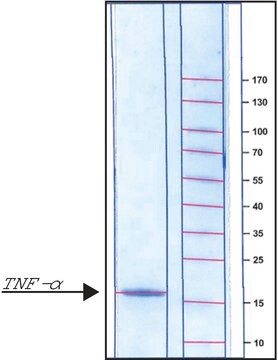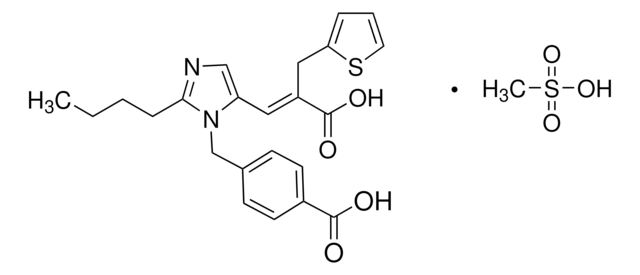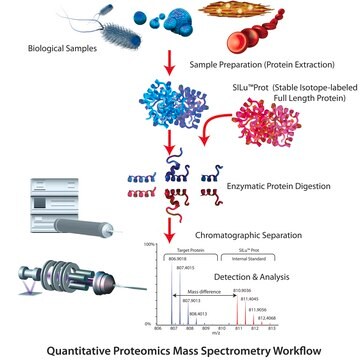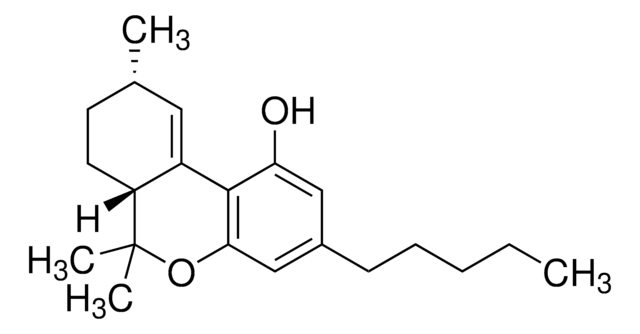推薦產品
生化/生理作用
The androgen receptor is an androgen-activated member of the nuclear receptor superfamily of transcription factors. Signaling by the androgen receptor plays a key role in proper development and function of male reproductive organs. The androgen receptor gene is more than 90 kb long and codes for a protein that has 3 major functional domains: the N-terminal domain, DNA-binding domain, and androgen-binding domain. The protein functions as a steroid-hormone activated transcription factor. Upon binding the hormone ligand, the receptor dissociates from accessory proteins, translocates into the nucleus, dimerizes, and then stimulates transcription of androgen responsive genes. This gene contains 2 polymorphic trinucleotide repeat segments that encode polyglutamine and polyglycine tracts in the N-terminal transactivation domain of its protein. Expansion of the polyglutamine tract causes spinal bulbar muscular atrophy (Kennedy disease). Mutations in this gene are also associated with complete androgen insensitivity (CAIS). Two alternatively spliced variants encoding distinct isoforms have been described. The androgen receptor (AR) has been shown to play a critical role in the development and progression of prostate cancer.
外觀
Clear and colorless frozen liquid solution
準備報告
Use a manual defrost freezer and avoid repeated freeze-thaw cycles. While working, please keep sample on ice.
儲存類別代碼
10 - Combustible liquids
水污染物質分類(WGK)
WGK 1
閃點(°F)
Not applicable
閃點(°C)
Not applicable
分析證明 (COA)
輸入產品批次/批號來搜索 分析證明 (COA)。在產品’s標籤上找到批次和批號,寫有 ‘Lot’或‘Batch’.。
Rute B Marques et al.
International journal of cancer, 117(2), 221-229 (2005-05-19)
To study the mechanisms whereby androgen-dependent tumors relapse in patients undergoing androgen blockade, we developed a novel progression model for prostate cancer. The PC346C cell line, established from a transurethral resection of a primary tumor, expresses wild-type (wt) androgen receptor
Shalini Murthy et al.
The Prostate, 64(4), 362-372 (2005-03-09)
1,25(OH)2D3 inhibits the growth of prostate cancer cells; previous reports suggest that 1,25(OH)2D3 actions in LNCaP prostate cancer cells are androgen dependent. This is due in part to the observation that the androgen receptor (AR) antagonist, Casodex, modestly inhibits LNCaP
Eric Metzger et al.
Nature, 437(7057), 436-439 (2005-08-05)
Gene regulation in eukaryotes requires the coordinate interaction of chromatin-modulating proteins with specific transcription factors such as the androgen receptor. Gene activation and repression is specifically regulated by histone methylation status at distinct lysine residues. Here we show that lysine-specific
我們的科學家團隊在所有研究領域都有豐富的經驗,包括生命科學、材料科學、化學合成、色譜、分析等.
聯絡技術服務


